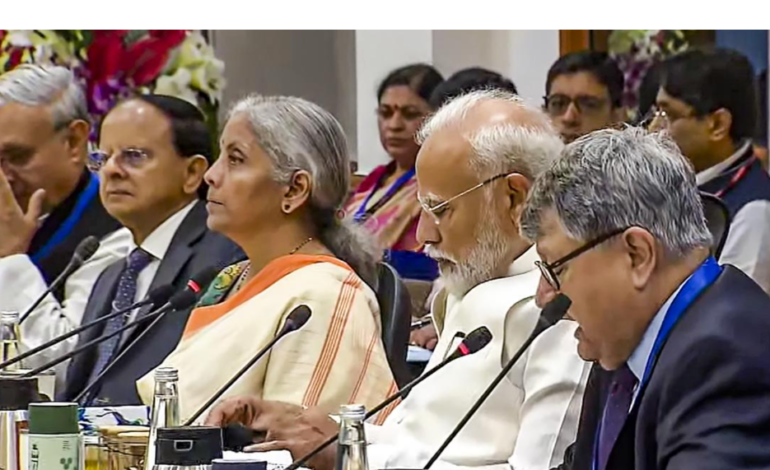
PM Modi holds brainstorming session with economists ahead of Budget
In preparation for the upcoming Union Budget for 2025-26, Prime Minister Narendra Modi on Monday held a meeting with leading economists and sectoral experts to gather insights and suggestions. The discussion focused on key strategies to strengthen India’s economic growth and ensure long-term stability.
Finance Minister Nirmala Sitharaman, who is slated to present the budget in the Lok Sabha on February 1, 2025, was also part of the meeting. The session was attended by notable figures such as Niti Aayog Vice Chairman Suman Bery, Niti Aayog CEO BVR Subrahmanyam, Chief Economic Advisor Anantha Nageswaran, along with distinguished economists like Surjit Bhalla and DK Joshi.
This brainstorming session comes at a critical time as the government is looking to sustain and accelerate its growth trajectory despite a slowing global economy. Key areas discussed during the meeting included the continuation of infrastructure investments and the implementation of reforms that would further stimulate job creation and economic expansion.
Focus on infrastructure and welfare schemes
The Indian government has already launched a series of welfare schemes aimed at supporting the economically disadvantaged. These include free foodgrain distribution, housing initiatives for the underprivileged, and other social safety nets, which have been crucial in lifting the living standards of millions across rural and urban areas.
The Prime Minister emphasized the government’s commitment to large-scale infrastructure projects, which are expected to play a central role in the country’s economic revival. These initiatives are aimed at creating employment opportunities while boosting productivity across sectors.
Easing inflation and fiscal stimulus
One of the significant discussions during the session also revolved around inflation control and economic stimulus. While inflationary pressures had been high earlier, recent data indicates a slowdown, particularly in food inflation, which has provided some relief. The Reserve Bank of India (RBI) recently reduced the Cash Reserve Ratio (CRR) for banks by 0.5 percent, from 4.5 percent to 4 percent, allowing for an infusion of Rs 1.16 lakh crore into the banking system. This move is expected to reduce interest rates and encourage borrowing and investment.
Experts anticipate that the upcoming budget will focus on a fiscal stimulus to further accelerate growth. The Indian economy remains the fastest-growing major economy globally, and the government’s tax collections have shown strong performance, which adds fiscal space to the budget. The country’s net direct tax collections rose by 15.4 percent, amounting to Rs 12.1 lakh crore from April 1 to November 10 during the current financial year.
Maintaining fiscal discipline
The government’s fiscal position remains robust, with the fiscal deficit well within manageable levels. As of October 2024, the fiscal deficit stood at 46.5 percent of the full-year target. The government aims to reduce the fiscal deficit to 4.9 percent of GDP in the current financial year, compared to 5.6 percent in the previous year. This reduction in the deficit is seen as a positive indicator of fiscal consolidation, ensuring that the government can continue to support infrastructure and welfare initiatives while keeping inflation in check.
With growing economic activity, India has also witnessed an increase in Goods and Services Tax (GST) collections, further strengthening its fiscal position. This positive trend in tax collections is expected to continue, enabling the government to invest in infrastructure and welfare schemes while maintaining fiscal stability.
Conclusion
The discussions held during the brainstorming session between PM Modi, economists, and government officials are expected to provide valuable inputs for the 2025-26 Union Budget. With a focus on infrastructure, welfare schemes, and fiscal stimulus, the budget will likely aim to address the ongoing economic challenges while positioning India for sustainable growth in the coming years. The government’s careful fiscal management, alongside buoyant tax collections, reflects a strong economic foundation that could further accelerate job creation and economic growth.